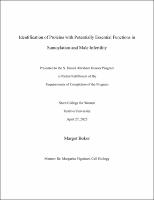Please use this identifier to cite or link to this item:
https://hdl.handle.net/20.500.12202/8988| Title: | Identification of proteins with potentially essential functions in sumoylation and male infertility |
| Authors: | Wigodner, Margarita Bokor, Margot |
| Keywords: | Spermatogenesis infertility male infertility sumoylation Sertoli cells |
| Issue Date: | 27-Apr-2023 |
| Publisher: | Yeshiva University |
| Citation: | Bokor, M. (2023, April 27). Identification of proteins with potentially essential functions in sumoylation and male infertility [Unpublished undergraduate honors thesis, Yeshiva University]. |
| Series/Report no.: | S. Daniel Abraham Honors Program;April 27, 2023 |
| Abstract: | Of all the couples trying to conceive in the United States, it is reported that roughly 20% do not successfully conceive in the first year of trying. Problems with fertility can be attributed to both the male and female in the couple. About 33% of infertility issues are of unknown causes for men. Spermatogenesis is the development by which haploid sperm cells are produced from the maturation of germ cells. Many proteins and biological processes are involved in the creation of sperm cells, including Sertoli cells. The developing spermatogonia are imbedded within the recesses of the Sertoli cells, and the Sertoli cells function to secrete proteins and hormones that aid in the maturation of these germ cells. An integral mechanism within all testicular cells, including Sertoli cells, is sumoylation, a post transcriptional modification process that alters the function of proteins via the addition of a SUMO peptide. Sertoli cells were treated with Ginkgolic Acid to inhibit sumoylation and the secreted proteins were compared to the secreted proteins of the control cells. Protein expression was studied using two-dimensional gel electrophoresis and the proteins were identified using mass spectrometry. All secreted proteins that exhibited a change in expression should be studied to better understand their role in spermatogenesis and Sertoli cells. Two proteins, Insulin-Like Growth Factor Binding Protein 7 and Protein 14-3-3 Beta/Alpha, exhibited the biggest fold-change in protein expression upon the inhibition of sumoylation. Additionally, these proteins, and/or the protein family, have established roles relating to spermatogenesis, Sertoli cells, and cell signaling. Due to both the previous research and the difference in protein expression, I believe that Insulin-Like growth Factor Binding Protein 7 and Protein 14-3-3 Beta/Alpha should be the primary focus of future studies to determine their roles in sperm cell development and infertility. |
| Description: | Undergraduate honors thesis / Open Access |
| URI: | https://hdl.handle.net/20.500.12202/8988 |
| Appears in Collections: | S. Daniel Abraham Honors Student Theses |
Files in This Item:
| File | Description | Size | Format | |
|---|---|---|---|---|
| Margot Bokor HonorsThesis OA 27Apr2023.pdf | 880.72 kB | Adobe PDF |  View/Open |
This item is licensed under a Creative Commons License

